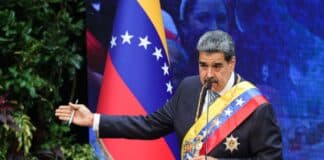During a speech at the Saudi-US investment forum in Riyadh, President Donald Trump urged Saudi Arabia to recognize Israel and join the Abraham Accords, which were initiated during his first term to normalize relations between Israel and several Arab nations, including Bahrain, the UAE, Sudan, and Morocco.
Trump addressed Crown Prince Mohammed bin Salman directly and emphasized the significance of Saudi participation as a major step toward sustained Middle East peace. He praised the benefits experienced by countries that joined the Accords and characterized them as a historic achievement.
Trump stated, “With the historic Abraham Accords that we’re so proud of, all the momentum was aimed at peace, aimed very successfully… It’s been an amazing thing, the Abraham Accords, and it’s my fervent hope, wish, and even my dream that Saudi Arabia — a place I have such respect for, especially over the last fairly short period of time, what you’ve been able to do — but will soon be joining the Abraham Accords.”
“I think it’ll be a tremendous tribute to your country, and it will be something that’s really going to be very important for the future of the future of the Middle East. I took a risk in doing them, and they’ve been an absolute bonanza for the countries that have joined the Biden administration did nothing for four years,” he went on to add.
Trump also issued a strong warning to Iran, threatening to impose “massive maximum pressure” and eliminate Iranian oil exports if a new nuclear deal is not reached. He linked the October 7, 2023 Hamas attack on Israel, which resulted in about 1,200 deaths, to disrupted normalization efforts, citing President Biden’s previous comments. Trump reiterated his stance that Hamas must be dismantled and controversially called for the relocation of Palestinians from Gaza for international development.
His visit to the Middle East marks his first major foreign trip in his second term, though no stop in Israel is planned. The trip underscores Trump’s emphasis on deal-making as a cornerstone of U.S. foreign policy.





